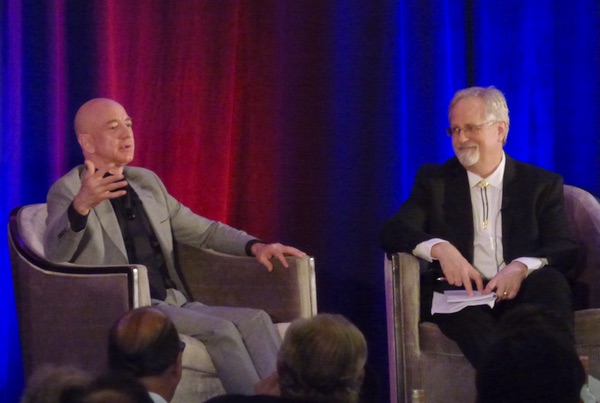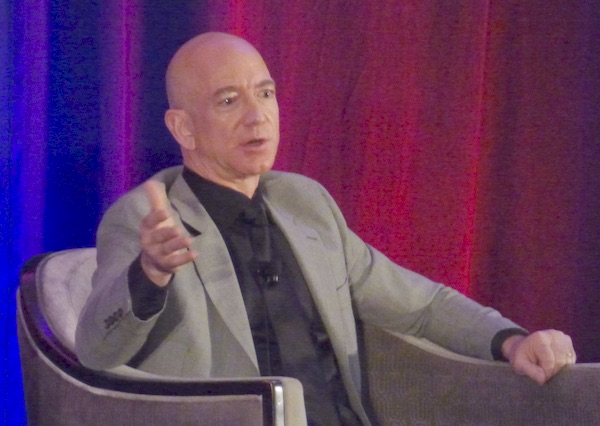Bezos and humanity’s future beyond Earthby Jeff Foust
|
| “You have to lower the cost of access to space to do these grand things that we’re talking about,” he said. “By the way, this is not something we can choose to do. This is something we must do.” |
“Does anybody here in this audience watch a TV show called ‘The Expanse’?” he asked at the beginning of an onstage interview at the National Space Society’s International Space Development Conference in Los Angeles May 25. The reaction from the audience in the hotel ballroom confirmed that, yes, many of them did watch a show set in a future where humans had settled much of the solar system.
Some of them did more than watch it: they were members of the cast and crew who participated in a panel discussion a few hours earlier. They were also, though, nervous about their future, as the SyFy network had announced earlier in the month that they were not picking up the series for a fourth season. Speculation about a new home for the show had included Amazon’s Prime Video service.
“I was talking to the cast just half an hour ago, right before dinner started,” Bezos said. “I was telling them that we were working hard at Amazon to save ‘The Expanse,’ but it wasn’t a done deal yet. And during dinner, ten minutes ago, I just got word that ‘The Expanse’—”
“Oh my God,” someone in the audience exclaimed before he could even finish.
“—is saved,” Bezos concluded. “The Rocinante is safe. It will be a Prime Original in the coming seasons.”
Bezos could have dropped the mic, figuratively or literally, and walked off the stage with that, and few in the audience would have been disappointed. Fortunately, he stuck around for a while to talk about real spaceflight and the plans of his company, Blue Origin.
Bezos, in that interview with GeekWire’s Alan Boyle, didn’t offer any major news about Blue Origin and its various projects, including the New Shepard suborbital vehicle, New Glenn orbital rocket and its BE-4 engine, which remains under consideration by United Launch Alliance for its Vulcan rocket as well. Instead, Bezos focused on the big picture of what those vehicles, and others, can achieve.
“You have to lower the cost of access to space to do these grand things that we’re talking about,” he said after a long discussion about a future where industry is moved off-Earth to take advantage of the energy and other resources of the solar system, something he’s discussed in the past. “By the way, this is not something we can choose to do. This is something we must do.”
“We need to do a better job of communicating how important this is, because this mission is so big,” he continued as the audience applauded. “We need the world to support it, and the people in this room have a part in educating the world about why this is a ‘must-do’ and not a ‘fun to do.’”
| “We’ll do stepwise whatever we need to do to get that vision to happen,” he said. “So one of two things will happen: either other people will take over the vision, or I’ll run out of money.” |
One element that stood out regarding Bezos’ talk was his emphasis on the Moon. He has long talked about being agnostic about solar system destinations, in contrast to Elon Musk’s laser focus on Mars, but in his ISDC interview made clear that establishing a human presence on the Moon was a priority for him and Blue Origin.
“Today, we must go back to the Moon, and this time to stay,” he said, after describing how Apollo 11 was an event “pulled forward, out of sequence” and thus not sustainable.
“We’re so lucky to have the Moon. It’s so conveniently located,” he said later. “We now know things that we didn’t know before. We know that there are volatiles trapped in the dark craters of the moon that are perpetually shaded. We know that there’s water there. There’s ice there. There are probably other interesting things in those craters as well.”
Blue Origin showed interest in the Moon last year with a lunar lander concept called Blue Moon that could take up to five tons of cargo to the lunar surface. The company has talked about developing that in a public-private partnership with NASA, but Bezos left open the door to doing it alone if NASA doesn’t want to cooperate. “We’ll do it eventually. But we could do it a lot faster if there were a partnership.”
 Jeff Bezos speaks on stage at ISDC with his interviewer, Alan Boyle. (credit: J. Foust) |
He also suggested the company could develop additional infrastructure, like rovers, but again only as a last resort. “We will do anything we need to do,” he said when asked if the company was studying lunar rovers. “I hope we don’t need to do any of it. I want other people to do it. But if need be, we’ll do it.”
“We’ll do stepwise whatever we need to do to get that vision to happen,” he said. “So one of two things will happen: either other people will take over the vision, or I’ll run out of money.”
That’s unlikely to happen soon for Bezos, whose net worth of more than $135 billion makes him the richest person in the world (Musk, with about one-seventh of that net worth, comes in at 55th place according to Forbes magazine, right behind another billionaire space entrepreneur, Paul Allen.) Bezos restated that he sells about $1 billion a year in Amazon stock, proceeds that primarily go to Blue Origin.
Bezos expressed support for the “Moon Village” concept, where countries and companies collocate facilities on the Moon in a loose form of collaboration. “The Moon Village concept has a nice property in that it basically just says, look, everybody builds their own lunar outpost, but let’s do it close to each other,” he said, but added that he’s not been in any formal discussions about Moon Village and any role Blue Origin would play.
| “My role is to help build that heavy lifting infrastructure, because I have the financial assets to do that,” he said. “That will set things up for this dynamic entrepreneurial explosion that will lead to this Gerry O’Neill world.” |
For a person whose main company, Amazon.com, has wreaked havoc across the retail landscape, Bezos said he was willing to share the space industry with others. “It won’t be done by one company. It won’t be done by just Blue Origin. It won’t be done by just NASA. It won’t be done by any particular company,” he said after discussing the importance of lowering launch costs. “This is going to take thousands of companies, working in concert over many decades.”
He rejected the “sports metaphor” for business where there is a winner and a loser. “In business, industries rise and fall. It is not a zero-sum game. It is often that there are multiple winners, and that’s what we’ve seen on the Internet.” (Retailers that have gone out of business or otherwise struggled to compete with Amazon might disagree.)
At the dinner, the NSS gave Bezos the Gerard K. O’Neill Memorial Award, named after the Princeton University physicist who, more than four decades ago, outlined a vision of space colonies that inspired, among others, Bezos.
“Professor O’Neill was very formative for me. I read The High Frontier in high school. I read it multiple times, and I was already primed,” he recalled, agreeing with O’Neill that “planetary surfaces were not the right place for an expanding civilization inside our solar system.”
Bezos went to school at Princeton while O’Neill was there, but the two never appeared to have met. “As far as I know, he never took Gerry’s introductory class,” Tasha O’Neill, Gerard’s widow, said of Bezos in remarks at ISDC. “I read that he did attend Gerry’s seminars regularly, but I’m not so sure that’s the case.”
O’Neill’s utopian vision of space colonies remains as distant now as it was 40 years ago, if not more so. Bezos, though, said he wants to help make it possible, someday. “My role is to help build that heavy lifting infrastructure, because I have the financial assets to do that,” he said. “That will set things up for this dynamic entrepreneurial explosion that will lead to this Gerry O’Neill world.”
Or, maybe, the conflict seen in “The Expanse.” But many in that room might be willing to accept that alternative future, just as they cheered the rescue of the TV series by Bezos, because it at least offers a future of humanity living and working beyond Earth.
Note: we are temporarily moderating all comments subcommitted to deal with a surge in spam.
